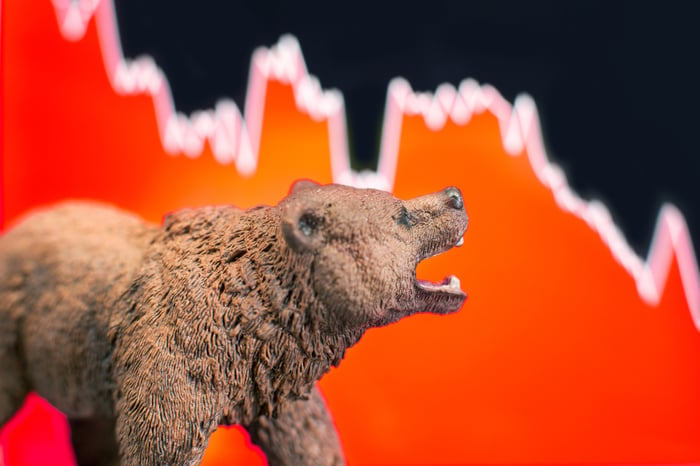It's been an ugly year for Wall Street. Since hitting an all-time closing high during the first week of January, the widely followed S&P 500 has tumbled as much as 24%. In fact, it produced its worst first-half return in more than a half-century.
But it's been even more of a struggle if you've hitched your wagon to the growth stocks that powered the Nasdaq Composite (^IXIC -0.64%) to a record high. Since mid-November, we've witnessed the Nasdaq lose as much as 34% of its value and firmly fall into bear market territory.

Image source: Getty Images.
On the one hand, bear markets can be terrifying, given the unpredictability and velocity of moves lower. But on the other hand, bear markets have provided a surefire opportunity to buy innovative companies at a discount. After all, every sizable drop in the major U.S. indexes, including the Nasdaq Composite, has eventually been recouped (and then some) by a bull market rally.
With that being said, here are five electrifying growth stocks you'll regret not buying on the Nasdaq bear market dip.
Nio
The first sensational growth stock investors won't want to miss out on during the Nasdaq bear market decline is China-based electric vehicle (EV) manufacturer Nio (NIO -0.48%). Despite supply chain issues and China's zero-COVID-19 strategy taking its toll on Nio's near-term production, the future looks as bright as ever.
Since most developed countries are focused on reducing their carbon footprint, Nio finds itself perfectly positioned to take advantage of what should be a multidecade vehicle replacement cycle for consumers and businesses. Nio happens to get an added boost by being based in the world's No. 1 auto market. By 2035, nearly half of all new vehicles sold in China are expected to be powered by alternative energy.
But it's Nio's innovation that really helps it stand out. The company has been introducing at least one new vehicle each year, and it's managed to deliver over 100,000 EVs on a trailing-12-month basis (through June 2022). Management has previously opined that without supply chain constraints, the company has an opportunity to ramp to 50,000 EVs produced on a monthly basis within 12 months.
We're seeing out-of-the-box innovation, too. Two years ago, Nio introduced its battery-as-a-service subscription, which allows its EV buyers to charge, swap, and upgrade their batteries at a later date. Enrollment also lowers the initial purchase price of a Nio EV. In return, Nio generates high-margin recurring subscription revenue and retains the loyalty of its early buyers.
Fiverr International
A second phenomenal growth stock you'll regret not scooping up during the Nasdaq bear market dip is online-services marketplace Fiverr International (FVRR -2.00%). Although economic data continues to suggest near-term weakness in the U.S. economy, Fiverr has clear-cut competitive advantages that make it a no-brainer buy.
The biggest catalyst Fiverr has going for it is its differentiated freelance marketplace. Whereas most competing online-service marketplaces list jobs on an hourly basis, the freelancers utilizing Fiverr market their jobs as a packaged deal. Providing an all-encompassing price for a task has vastly improved cost transparency and encouraged buyers to progressively spend more per transaction over time. Even as economic uncertainty has increased, spend per buyer on Fiverr has continued climbing.
What's more, Fiverr International's take rate is unmatched within the online-service marketplace arena. The "take rate" describes the amount of money Fiverr gets to keep from each deal negotiated on its platform. While most of its competitors have take rates in the mid-teen percentage range, Fiverr reported a take-rate of 29.8% during the second quarter.
With the U.S. economy spending considerably more time expanding than contracting, betting on remote-work growth over the long run seems like a smart move.

Image source: Getty Images.
Palo Alto Networks
The third electrifying growth stock you'll regret not buying hand over fist as the Nasdaq plunges is cybersecurity company Palo Alto Networks (PANW -1.71%). While short-term economic weakness has hit virtually all tech stocks, Palo Alto offers sustainable double-digit growth for a long time to come.
The beauty of cybersecurity is that it's evolved into a basic necessity service in any economic environment. No matter how poorly the U.S. economy or stock market performs, hackers and robots don't take time off from trying to steal enterprise and customer data. This provides predictable operating cash flow for Palo Alto Networks and many of its peers.
What makes Palo Alto so intriguing is the company's ongoing transformation that emphasizes cloud-based subscriptions. Over the past five years, the company's total sales from subscriptions and support have grown from about 60% to 75%. This shift is important because cloud-based subscriptions usually generate higher margins than physical firewall products. Additionally, leaning on subscriptions should minimize client churn and reduce the revenue lumpiness associated with physical product replacement cycles.
Palo Alto Networks has also done an excellent job of making bolt-on acquisitions to broaden its service ecosystem and reach new customers.
Trulieve Cannabis
A fourth stellar growth stock that you'll regret not adding during the Nasdaq bear market decline is U.S. cannabis multi-state operator (MSO) Trulieve Cannabis (TCNNF -6.26%). Even though marijuana reform has gained no traction on Capitol Hill, state-level legalizations provide plenty of fuel for Trulieve to succeed.
To keep with the theme of this list -- differentiation -- what's really allowed Trulieve Cannabis to stand out is its expansion strategy. While most MSOs have planted their proverbial flag in as many legalized markets as possible, Trulieve focused almost all of its attention on Florida's legal medical marijuana market until last year. The company has 174 operating dispensaries as of Sept. 6, 2022, of which 120 are in Florida. These 120 dispensaries represent over a quarter of all open retail locations in the Sunshine State.
By saturating the Florida market, Trulieve has been able to keep its marketing costs down, all while building up its brands and garnering a loyal following. With minimal marketing expenses, Trulieve has been able to generate 18 consecutive quarters (4-1/2 years) of adjusted profits. Keep in mind that most MSOs aren't yet profitable.
Trulieve also made waves with its acquisition of Harvest Health & Recreation in 2021. Buying Harvest Health instantly made Trulieve the dominant player in Arizona, which legalized recreational weed in November 2020 and commenced retail sales in January 2021. Trulieve shouldn't have any issue compounding its success in new markets.
PayPal Holdings
The fifth electrifying growth stock you'll regret not buying on the Nasdaq bear market dip is fintech stock PayPal Holdings (PYPL -1.14%). Though historically high inflation is wreaking havoc on the lowest decile of earners, PayPal's key performance metrics suggest the company is as strong as ever.
For instance, U.S. gross domestic product declined in each of the first two quarters of 2022, which signals something of a "technical recession," even if one hasn't been officially declared. In spite of this economic weakness, total payment volume (TPV) traversing PayPal's platforms rose by 13% in the second quarter on a constant currency basis from the previous year. Since periods of expansion last much longer than recessions, just imagine how much TPV could expand in the years to come.
What's even more important for PayPal is that its users remain engaged. Through June, active accounts were averaging almost 49 transactions over the trailing-12-month period. By comparison, active accounts at the end of 2020 were completing just shy of 41 transactions over the trailing 12 months. Because PayPal's operating model is primarily built on fees, an increasing number of transactions by active accounts is a positive sign for gross profit.
As I've previously pointed out, innovation is key with PayPal as well. The company's acquisition of buy now, pay later (BNPL) service Paidy last year is a perfect example. Paidy is a leading BNPL service in Japan that gives consumers more payment options and provide merchants with additional pathways to grow their business.
Fundamentally, PayPal is about as cheap as it's ever been as a publicly traded company -- 19 times Wall Street's forward-year earnings forecast -- which is what makes it a screaming buy.





